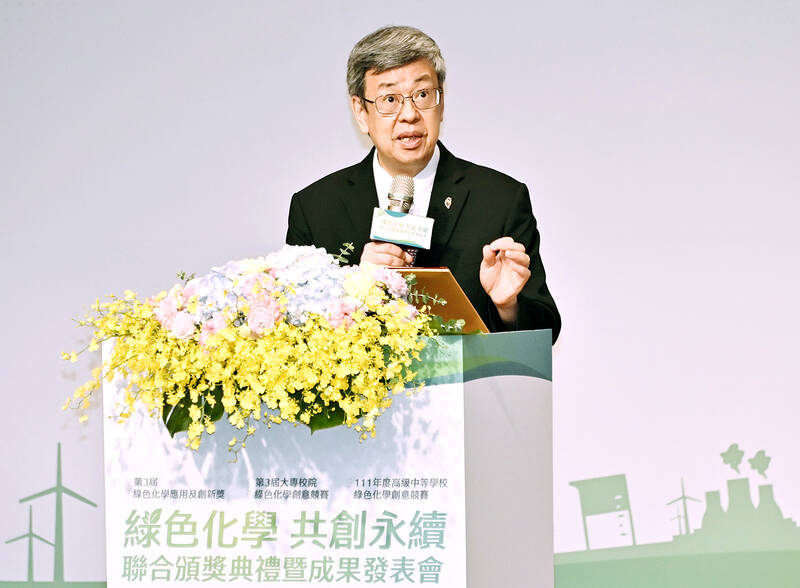An administrative mandate to consider Chinese as Taiwanese citizens was outdated, Premier Chen Chien-jen (陳建仁) said yesterday, a day after the Executive Yuan ordered that agencies disregard the 30-year-old interpretation.
Chen made the remarks at an event held by the Environmental Protection Administration in Taipei following changes to the administrative mandate concerning the Act Governing Relations Between the People of the Taiwan Area and the Mainland Area (臺灣地區與大陸地區人民關係條例).
The previous interpretation of the law was archaic and contrary to the workings of laws and regulations, he said, adding that the order was made to avoid unnecessary problems created by the mandate.

Photo: Chen Yi-chuan, Taipei Times
The Mainland Affairs Council would evaluate whether legislative actions would be needed to amend the law, Chen said.
The Executive Yuan’s change came three months after the High Court ordered the Kaohsiung City Government to pay NT$4.63 million (US$150,579) in state compensation after the accidental death of a Chinese citizen surnamed Qian (錢).
Qian was electrocuted by a malfunctioning street light while cycling in Kaohsiung’s Lujhu District (路竹) during a round-the-nation cycling tour in August 2018.
The man’s family was to receive reparations, despite the absence of reciprocal restitution arrangements with Beijing, as Chinese citizens are deemed Republic of China (ROC) nationals under the law, the court said in its ruling, citing a clarification issued by the Mainland Affairs Council.
This interpretation is contrary to mutual nonsubordination of Taiwan and China, and the apparent difference between Chinese and ROC nationals, the Executive Yuan said.
Starting from the day of issuance, the administrative mandate has been removed, and all government agencies are to amend regulations and policies accordingly, it said.
“That only ROC citizens have the rights of being Taiwanese is the [interpretation] that conforms with the spirit of the rule of law in a democratic nation,” Democratic Progressive Party (DPP) Legislator Michelle Lin (林楚茵) wrote on Facebook yesterday.
The administrative mandate has supported cognitive warfare by China, DPP Legislator Cheng Yun-peng (鄭運鵬) added.
The order from the Cabinet would mean that judges would no longer be required to confer ROC national status to people from China, he said, adding that any such ruling would be “the personal ideological problems of the judge.”
Chinese Nationalist Party (KMT) Legislator Lee De-wei (李德維) was cited by the Chinese-language China Times as saying that the Executive Yuan’s order is a political attack on the integrity of the judiciary and laws.

A magnitude 5.6 earthquake struck off the coast of Yilan County at 12:37pm today, with clear shaking felt across much of northern Taiwan. There were no immediate reports of damage. The epicenter of the quake was 16.9km east-southeast of Yilan County Hall offshore at a depth of 66.8km, Central Weather Administration (CWA) data showed. The maximum intensity registered at a 4 in Yilan County’s Nanao Township (南澳) on Taiwan’s seven-tier scale. Other parts of Yilan, as well as certain areas of Hualien County, Taipei, New Taipei City, Taoyuan, Hsinchu County, Taichung and Miaoli County, recorded intensities of 3. Residents of Yilan County and Taipei received

Taiwan has secured another breakthrough in fruit exports, with jujubes, dragon fruit and lychees approved for shipment to the EU, the Ministry of Agriculture said yesterday. The Animal and Plant Health Inspection Agency on Thursday received formal notification of the approval from the EU, the ministry said, adding that the decision was expected to expand Taiwanese fruit producers’ access to high-end European markets. Taiwan exported 126 tonnes of lychees last year, valued at US$1.48 million, with Japan accounting for 102 tonnes. Other export destinations included New Zealand, Hong Kong, the US and Australia, ministry data showed. Jujube exports totaled 103 tonnes, valued at

BIG SPENDERS: Foreign investors bought the most Taiwan equities since 2005, signaling confidence that an AI boom would continue to benefit chipmakers Taiwan Semiconductor Manufacturing Co’s (TSMC, 台積電) market capitalization swelled to US$2 trillion for the first time following a 4.25 percent rally in its American depositary receipts (ADR) overnight, putting the world’s biggest contract chipmaker sixth on the list of the world’s biggest companies by market capitalization, just behind Amazon.com Inc. The site CompaniesMarketcap.com ranked TSMC ahead of Saudi Aramco and Meta Platforms Inc. The Taiwanese company’s ADRs on Tuesday surged to US$385.75 on the New York Stock Exchange, as strong demand for artificial intelligence (AI) applications led to chip supply constraints and boost revenue growth to record-breaking levels. Each TSMC ADR represents

TRUST: The KMT said it respected the US’ timing and considerations, and hoped it would continue to honor its commitments to helping Taiwan bolster its defenses and deterrence US President Donald Trump is delaying a multibillion-dollar arms sale to Taiwan to ensure his visit to Beijing is successful, a New York Times report said. The weapons sales package has stalled in the US Department of State, the report said, citing US officials it did not identify. The White House has told agencies not to push forward ahead of Trump’s meeting with Chinese President Xi Jinping (習近平), it said. The two last month held a phone call to discuss trade and geopolitical flashpoints ahead of the summit. Xi raised the Taiwan issue and urged the US to handle arms sales to